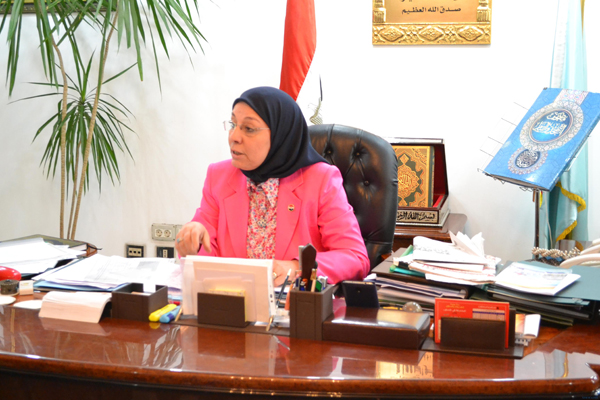by Mohamed Nagib
Dr Nahed al-Ashri, the minister of manpower and immigration, has confirmed that she holds no favouratism for any of the labour syndicates, and says that as independent entities they cannot be ignored. She says the lack of job security is the main reason for the reluctance of young people to work in the private sector, and notes the introduction of labour courts in the new labour law.
Ashri also emphasises that Egypt has no need of any workers from abroad, and the Egyptian labour market has the permanent advantage of being able to supply a labour force across the Arab world. Vocational training centres are currently being developed for all the professions and disciplines required.
The Middle East Observer met the minister to discuss many of the issues of concern to workers and employers.
What can you say about the draft of the new labour law?
The project for the new labour law will be coordinated with the law of social insurance. It will look at insurance for work-related injuries and solutions involving labour disputes, as well as special courts that will exempt workers from legal fees and access to a lawyer pursuant to article 98, paragraph II of the Constitution, “the law will provide all means by which those who are financially unable can resort to justice and defend their rights.”
Young people will be playing a vital role in the next phase. How can we make the best use of them?
Young people will play a pivotal role at the Ministry of Manpower in the next phase. I am trying to form groups and negotiating teams of young people, and this will be done by selecting those with experience in this field and training them.
Although there are many job fairs and the ministry has declared new job opportunities, there is still an unemployment crisis. Why is this?
Everyone should know that the unemployment problem is a national one and not born of the moment, and Egypt is not the only country to suffer from an unemployment problem. The Ministry of Manpower and Immigration is trying to reduce the effects of this on the national economy by providing jobs in the private and investment sectors. We have already provided about 33,000 jobs which were announced in the media, and the demand was very high.
Why are young people unwilling to work in the private sector?
I believe the main reason for the reluctance of young people to work in the private sector is the lack of adequate legislative protection, or what is known as job security. We are trying to secure this protection by introducing substantive amendments to the provisions of the current labour law to help motivate young people to work in this sector. We will also appoint new inspectors of masters’ and doctoral degrees to ensure the correct application of the provisions of the labour law and protection for workers.
What are you doing to protect workers in the private sector from the arbitrary decisions of employers?
Some arbitrary actions amount to crime punishable under the penal code, and the laws of the State must be followed with respect by workers. The draft of the new labour law addresses arbitrary decisions of employers with respect to the resignation of a worker. It starts by an amendment to the rule that when a worker submits his or her resignation to the employer, it is credible only if given in writing and signed. Now the worker can continue to work and make a final decision within ten days of the date of the submission, and the worker may reverse the resignation in writing within a week from the date of notification
Non-regular employment represents 80 per cent of the labour market. What is your vision for their legal, social and health protection, employment guarantees and insurance?
This is a big and basic file, and in my opinion it requires care and attention that must take into consideration labour legislation concerning their rights, and also include cases of stability in labour employment. When you go to work you should feel safe, and you should not be threatened with dismissal.
To what extent has the project for State-run factories been reached?
We are working on this project, but the priority is for factories that hold on firmly on to their workers, public sector factories like Mahalla yarn, and in three Samanoud factories. We will do some restructuring, retaining successful leadership and giving priority to factories in the public sector.
What is your vision for redundant workers and idle factories?
The prime minister was clear in calling for full coordination with the relevant ministries. He has already discussed the crisis with the minister of industry and investment. Workers who have been dismissed workers should be assessed for their different situations and should be classified among those workers who had compensation and those who did not. The Minister of justice must intervene, especially as the new labour law calls for the establishment of labour courts specialising in the affairs of workers to speed up the judicial chapter in labour disputes.
How do you view job strategies?
I will cancel the national employment newsletter and publish only the announcement of the real functions provided by the ministry. I am trying to create a network linking directorates in the ministry, and this network will announce the posts, together with salaries and number of hours. These will be made available for everyone so that they can choose the appropriate position.
What is your role in developing training centres?
The ministry has 33 fixed base centres spread over 21 governorates, as well as 11 mobile training centres. The ministry is currently developing vocational training centres to suit the various professional and technical disciplines. We recognise the need to upgrade the capabilities of the vocational training centres across the governorates and provide all the necessary facilities to update these centres, and develop new professions as required by the labour market. We will stress the development of methods and systems of vocational training programmes to align those needs to providing the necessary technical labour for investors and the private sector in all industrial and productive fields.
In addition, there will be a rapid training system for those without literacy or proficiency in reading and writing. A four-month training programme will meet the urgent needs of the labour market.
How do you deal with various labour syndicates?
I stand at the same distance from every labour syndicate and deal with them all with full and complete neutrality. I use all my energy and my thoughts, and I respect the freedoms and international conventions and recommendations of the syndicates as signed by Egypt. I stick to them, and with all Egyptian workers. First and foremost, I am a minister for all workers no matter what their differences and which union they are affiliated to, whether they follow the General Trade Union Workers of Egypt or any of the independent unions, because I do not belong to any party or a particular organisation and extend my hand to all for the sake of Egypt and its workers. Then the independent trade entities cannot be ignored, and all have their experiences and drawbacks and positives. We hope to exit the Trade Unions Act in the near future and regulate the relationship between all labour union organisations and state institutions.
How do you tackle the problem of illegal emigration?
We have recently opened an office for consulting and emigration in three governorates: Qaliubiya, Minya and Fayoum. Under the ministry’s plan for opening new offices for emigration consultation in governorates that are affected by illegal emigration, we will educate young people on the dangers of illegal immigration and respond to those young people who wish to emigrate. We will handle enquiries in cooperation with the International Organisation for Migration. The ministry is represented by the Emigration and Egyptians abroad sector for the follow-up and care of Egyptians abroad. This works in many ways, including conducting seminars on a regular basis through video conference in order to connect with them and learn of the problems they are facing abroad and try to resolve them. We will discuss with scientists in all fields how they can contribute to sustainable development within Egypt through their ideas and projects, and we will receive proposals and complaints from Egyptians abroad by e-mail. The most important services and information provided for them are displayed on the sector’s official website at Immigration Affairs.
Workers in the Gulf states are often exposed to abuse. How you can protect the rights of these workers?
There is a preference for Egyptian labour in Arab countries, and the current numbers according to the Ministry of Egyptian Labour Abroad are more than four million. This is since the revolutions of 25 January 2011 and 30 June 2013. Saudi Arabia now accommodates the largest number, and Kuwait comes in second place with Jordan third, the United Arab Emirates fourth, followed by Libya, Qatar, Lebanon, Oman, Greece, Bahrain, Italy and Cyprus. There are also 22,000 sailors employed on foreign ships.
The ministry is always keen on workers’ rights for Egyptians who work abroad legally. There is no doubt that there are on the whole of various places with labour laws contrary to our laws. This may apply in the countries they enter for the sake of searching for a job, but we have through our labour representatives abroad the means to help improve conditions within the framework of the laws of these countries, and I should like on this occasion to pay tribute to the care that Egyptian workers take in Arab countries and the response of the labour ministers in these countries to resolving the problems Egyptian workers encounter and their help in finding solutions.
















